|
1 Goschen Road
Dover
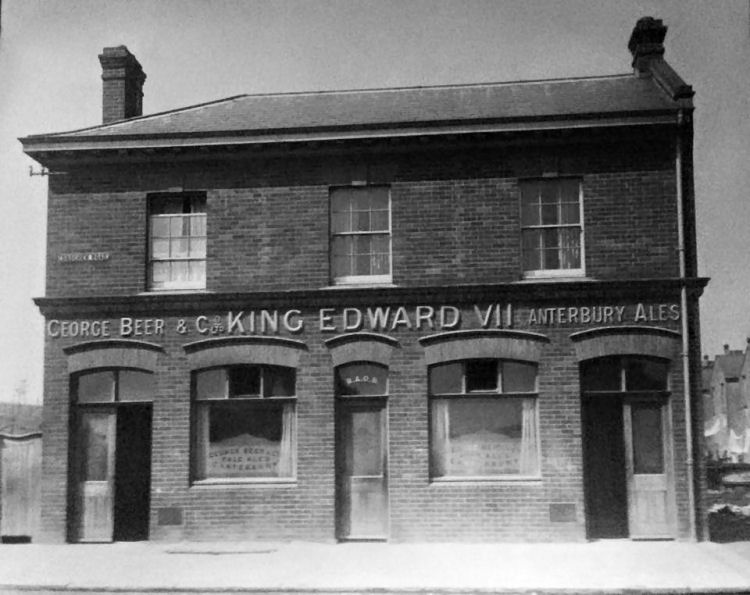
Above photo from the John Gilham collection, circa 1920. |
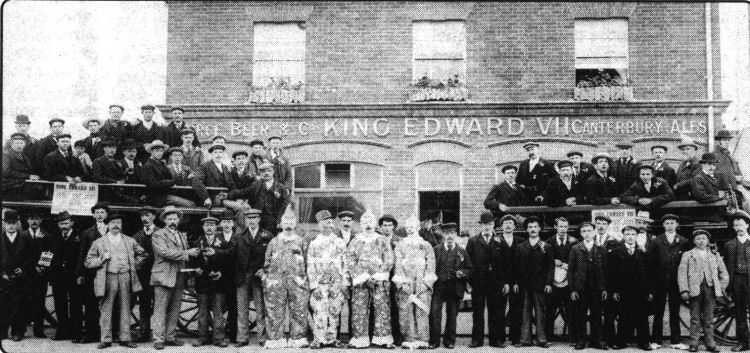 TWO FINE horse-brakes in Goschen Road, Tower Hamlets, apparently
about to set off on an all-male outing of the King Edward VII
"Judge and Jury Club," practically everyone wearing a button-hole while
four wear clown outfits. Others carry musical instruments. In front
towards the left one member appears to be wearing a chain of office and
holds a quill pen and inkwell. |
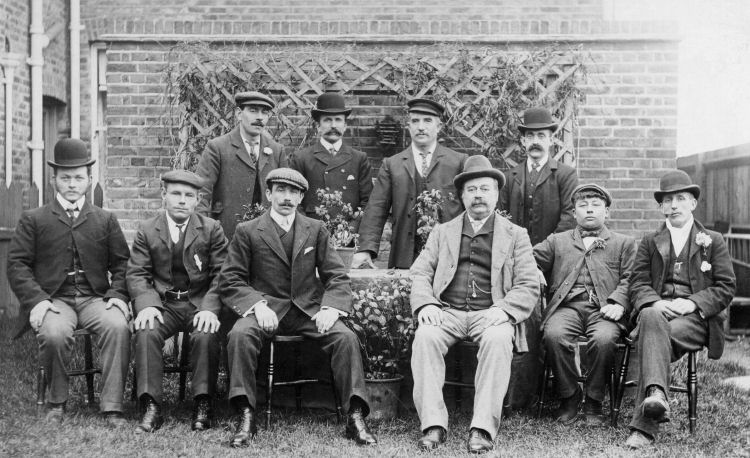 Above showing the members of the "King Edward VII" Club, date unknown.
The following email received 8 August 2014, says the following:- The
portly gentleman in the lighter suit with the hat is my Great great
grandfather William Henry Rodgers, the first landlord of the pub. This
dates the photo between 1902-06. Hope this helps.
Kind regards,
Gary Rodgers.
|
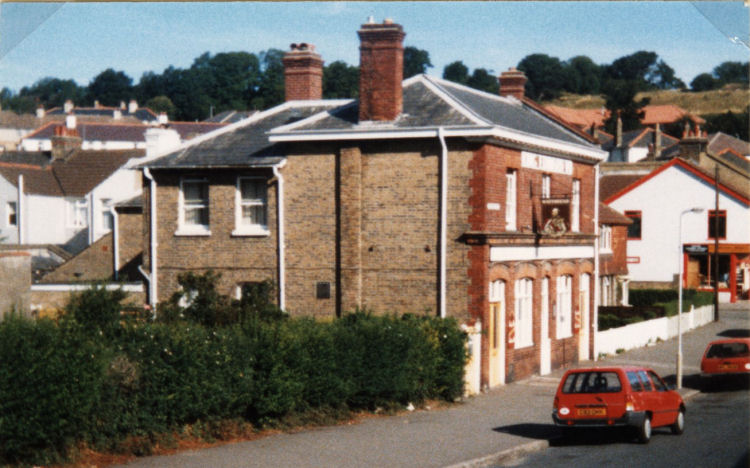
Above photo circa 1980 photo by Barry Smith. |
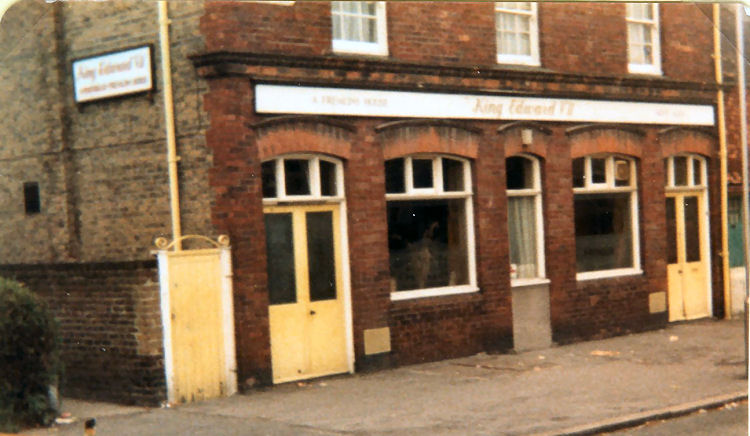
Above photo circa 1980 by Barry Smith. |
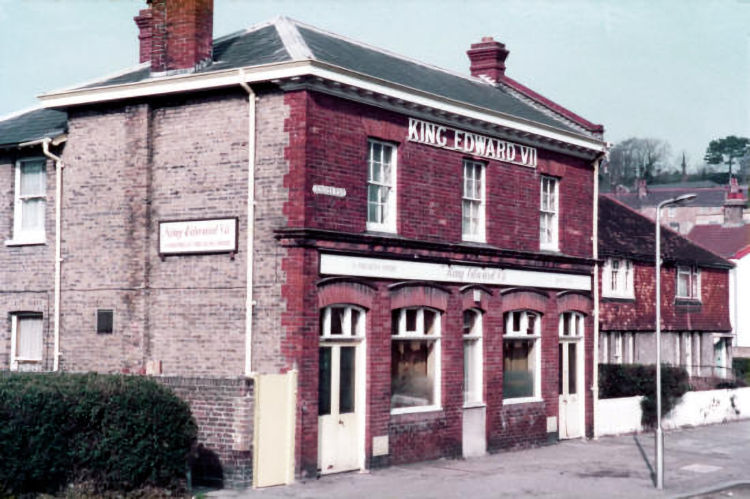
Above photo, 1983. Photo by Eddie Chard. |
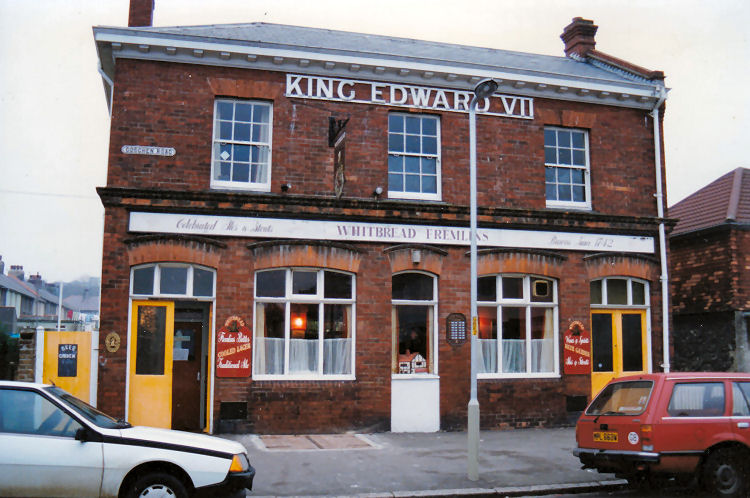 Above photo, 1996, kindly sent by Michael Lock. |
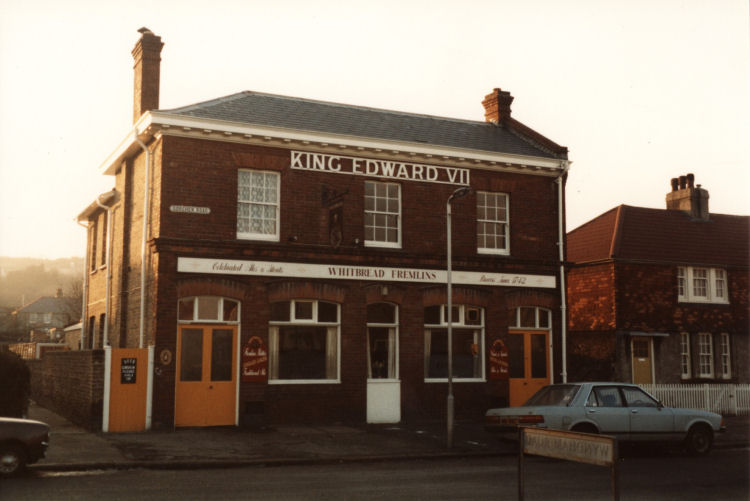
King Edward VII circa 1987 (Photo Paul Skelton) |
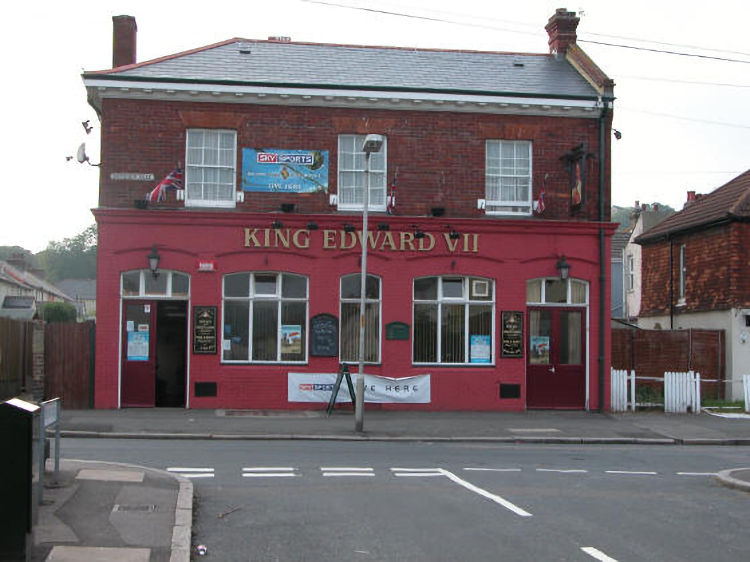
Above photo, date unknown. |
|
From the Dover Express and East Kent News. 2 December, 1955.
SCHOOLS BROKEN INTO
Public House, Too
Thieves broke into two Dover schools during the week-end. On Monday
morning returning staff found that St. Martin's School and Astor School
had been entered and in each case a small amount of money was stolen. At
St. Martin's School teachers' desks were broken open and overturned.
On Sunday, the "King Edward VIIth" public house in Goschen Road was
broken into and a little money stolen.
|
|
From the Dover Express and East Kent News. 15 February, 1963.
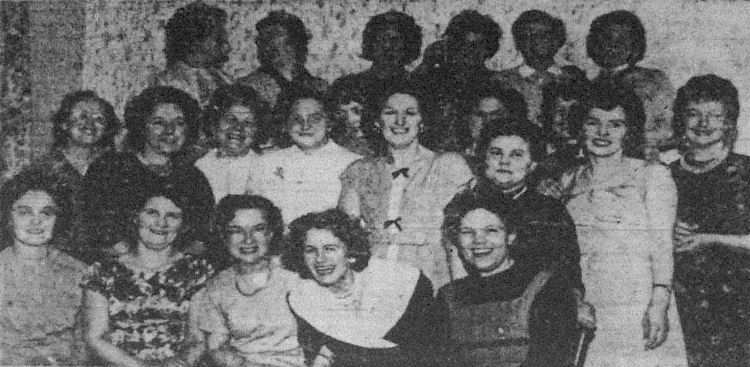
Young Wives of Tower Hamlets at their party at the King Edward VII,
on Saturday.
|
A licence application by George Beer in 1900, for a house he proposed
building on the corner with Wyndham Road, at a provisional cost of £2,000,
was rejected. He had offered to surrender the "Marquis of Waterford" but
nine other licensed houses already plied their trade in Tower Hamlets.
|
From the Dover Express and East Kent News, Friday, 30 August, 1901. Price 1d.
ANNUAL LICENSING DAY
A TOWER HAMLETS APPLICANT
Mr. Rutley Mowll applied for a provisional licence on behalf of Mr. W.
C. Newton Chapman at Devonshire Road, Tower Hamlets. He remarked that he
was afraid that he had to contend with the opposition of the
teetotallers, but he understood the Licensed Victuallers did not oppose.
Mr. Aldington observed that his attitude was one of benevolent
neutrality. (Laughter.)
Mr. Mowll said it would be remembered that he made the application for a
licence at the Tower Hamlets Estate last year, but the Bench were
apparently of opinion that the application was a little premature. He
came before them this year very much strengthen in making the
application because of the number of house built in the locality and the
number of plots sold which would be shortly built upon. In fact a new
Dover was cropping up at the back of Tower Hamlets. His clients were
prepared to give up a fully licensed house, the “Royal Oak,” Oxenden
Street. He thought the transference of the licence from that
neighbourhood would be a benefit to the community.
Mr. W. J. Jennings, architect, produced plans of the estate, showing the
position of the proposed public house. The only house in the
neighbourhood was the “Dewdrop.” In addition to the houses built, 48
plots had been sold, and since the application last year, 50 to 60
houses had been built, and a large number of plots were shortly to be
sold. He also produced plans of proposed houses. The cost of it was
estimated at £2,000.
Cross-examined by Mr. Bradley. The plot of land was in Goschen Road.
There were no houses in the road yet, and the road had not been made up.
The nearest road was Devonshire Road, and there were 41 houses there.
The whole of them were put up since the last application. Some other
houses had been put up in Douglas Road. Half of that road was nearest
the “Dewdrop.” There were several other houses in Tower Hamlets within a
quarter of a mile.
A memorial signed by every resident on the estate was put in.
Mr. M. Bradley called the Rev. E. G. L. Mowbray, Vicar of St.
Bartholomew's, who said the site of the house was within his parish. He
considered the gathering of the licence neither necessary or desirable.
There were already nine houses in the Tower Hamlets District.
Cross-examined by Mr. Mowll. Under certain circumstances he would not
oppose an application for a licence. There would have to be considerably
more houses built before he would not oppose. He would not state the
number as it might bind him to another year. (Laughter.)
Mr. Bradley put in a memorial signed by 79 persons against.
Mr. Bradley, in addressing the Bench in opposition to the
applications, said that he would deal first of all with the new
application, which would require very few words. He then came to the
three applications which were really a repetition of the applications
refused last year. They all had one objection, they were premature, or,
to apply an American term, they were previous. In each case they heard a
great deal about plots being sold. That showed the weakness of the
applications. It showed that the houses which were to be supplied had
not yet been built. It was time for the licensed top be granted after
the houses had been erected on the plots mentioned as having been sold,
and until then they ought not to be granted. As regards Mr. Chapman's
application, he did not think it was in such a suitable locality as the
one preceding it. There was not a single house erected in the road in
which the licence was asked for. Surely this was premature; it could not
be necessary to grant a licence to a house in a road where there was no
other houses.
The Magistrates then retired, and after an absence of three minutes
returned.
The Chairman said: The Magistrates have considered these
applications, and have come to the conclusion that they will grant the
application of Mr. Chapman, on condition that the houses proposed to be
surrendered be given up.
This was all the business.
|
A second try by Newton Chapman was presented in 1901. That time the
surrender of the "Royal Oak" in Oxenden Street was suggested. Forty one
houses had meanwhile been erected in Devonshire Road as well as others in
Douglas Road so he was favoured. A slight alteration in the site though, to
the corner with Devonshire Road.
The opening was in 1902, the licensee William Henry Rogers, and the pub
now serves Whitbread.
Jimmy Cairns relinquished this post to gradually move closer to town and
after a number of pubs eventually ended up as landlord of the "Dewdrop."
Larger than life Bowler hatted character, he stood for election as
Conservative candidate and was mayor of Dover between 1937 and 1943.
|
From an article 'Colourful
Characters From Dover Past' by Shirley Harrison. Unknown date.
"JIMMY CAIRNS" - "FRONT LINE" MAYOR 1881-1969
Like Winston Churchill, with whom he was photographed many times,
bowler-hatted Jimmy Cairns was larger than life. He saw Dover right
through the Second World War to become the longest-serving Mayor this
century. And when it as all over, like Churchill, the 'pig-headed old
Geordie' was passed by. No honours. No knighthood.
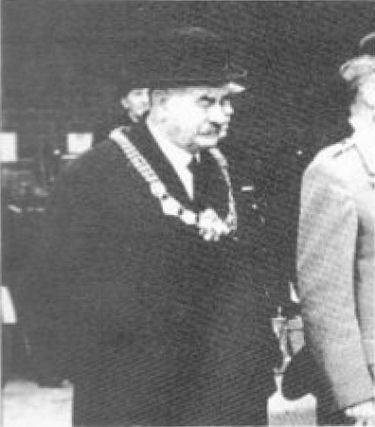
"If he'd kept his mouth shut he'd have been knighted... his language
was a bit grim," said a former Town Sergeant.
James Robinson Cairns was born in Willington-on-Tyne in 1881 and never
forgot his origins. He began work as an apprentice fitter in Dover at
the age of 12. After travelling the world, he returned to the town in
1919 as licensee of the "King Edward VII" pub in Goschen Road. He also
stood for election, as Conservative candidate for the St. Bartholomew
Ward, which he was to represent for 25 years.
He became Mayor in 1937 and remained in office at the outbreak of war
because he was a well known personality, who, it was believed, could
unite the public. "We all knew him, and accepted what he was," said a
former colleague. He became a figurehead.
Under his leadership the Council fought the Government over local
plans to excavate new tunnel-shelters in the cliffs.
The national press described him as a 'burley figure, a man with a
downright manner and an 'I've got my foot in the door' look in his
bowler-hatted and imperturbable."
He wholeheartedly opposed the evacuation of children from London to
Dover and urged local residents to get out if they could. When there was
talk of a military take-over of the town, the Mayor and Corporation
stood fast.
But the Mayoral chain was not not untarnished and the legends about
him were legion.
It was whispered that his pint-pulling experience meant that he was
sometimes a liability. If important decisions were to be taken in the
later years the rumour is that Mayor Cairns was occasionally locked in
the lavatory!
When sirens went customers at the pub who preferred to stay put
would, so it is said, be locked in - while their landlord drove off to
a safe place in the country.
One of his last duties a Mayor was to take King George VI and Queen
Elizabeth (the present Queen Mother) on a visit round the town following
the capture of German guns, which the Council hoped would win the town a
George Cross. But there was to be no medal for Dover.
Jimmy Cairns took the disappointment with typical ebullience. "One
gets little appreciation for years of public service - not that it
worries me..." His death in 1969 rated a small single column obituary in
the local paper!
|
|
Dover Express 8th June 1945.
TOWN, PORT & GARRISON.
A collection for our Merchant Seamen at the Ladies Self-Help Club at the
“King Edward VII” raised £2. 10s (per Mrs. E. A. Terry, the Secretary,
Douglas Road).
|
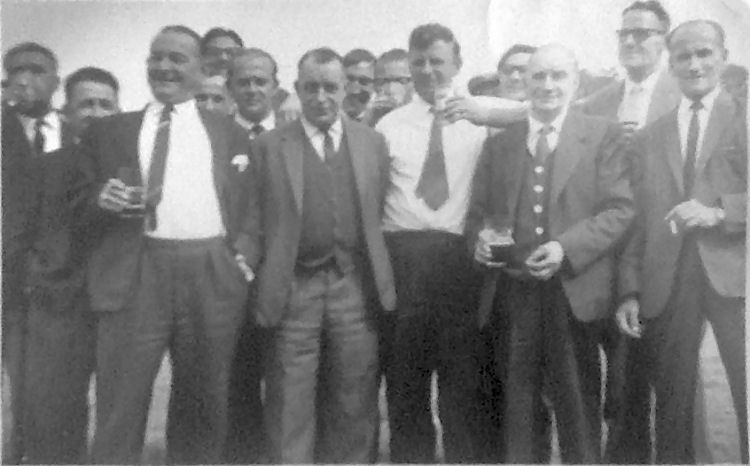
Above photo, date unknown, showing regulars at either the "King Edward"
or the "Carriers Arms," probably during
an outing. |
Closed, hopefully temporarily around April 2009. Open again September
2009. Closed again May 2010.
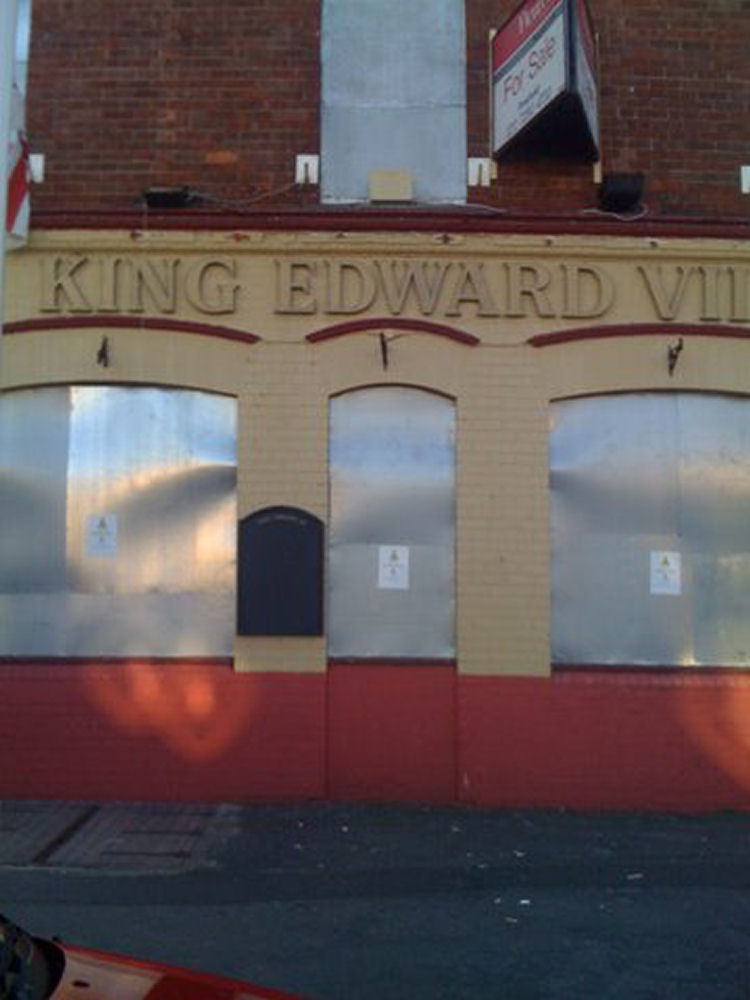
Photo taken by Chris Grimes, 23 July 2010. |
1st January, the pub seem to have had all the boards taken off the
windows and the lights have been on, both inside and outside, so I'm hoping
it's again open. Unfortunately this is not the case, the workmen were inside
removing the beer engines etc.
|
From the Dover Mercury, 17 February, 2011.
STORE ON PUB SITE WOULD CREATE JOBS
A PUBLIC house in Dover could be turned into a convenience store.
Thevalingam Thevakumar is asking the district council for the change
of use of the "King Edward VII" pub in Goschen Road.
he plans to open the shop from 7am to 10pm seven days a week.
|
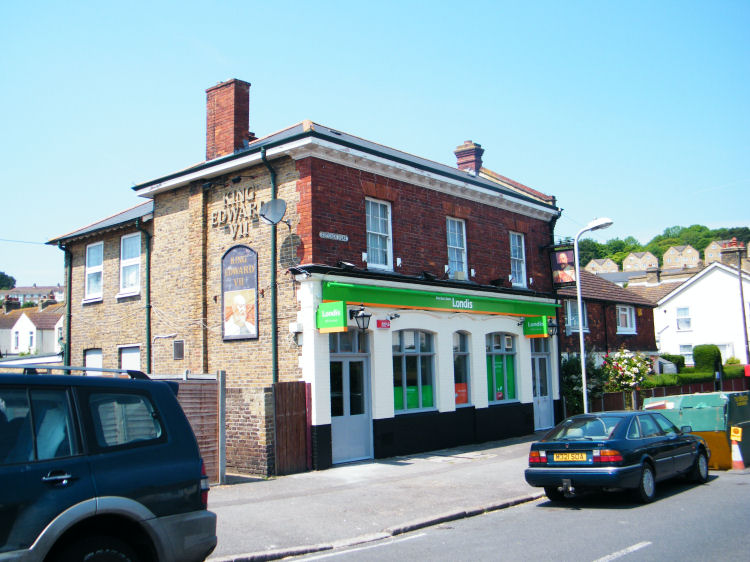
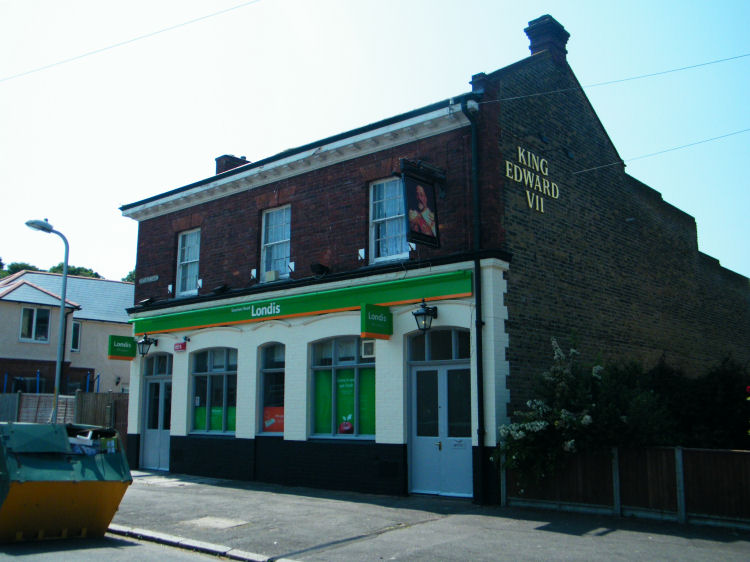
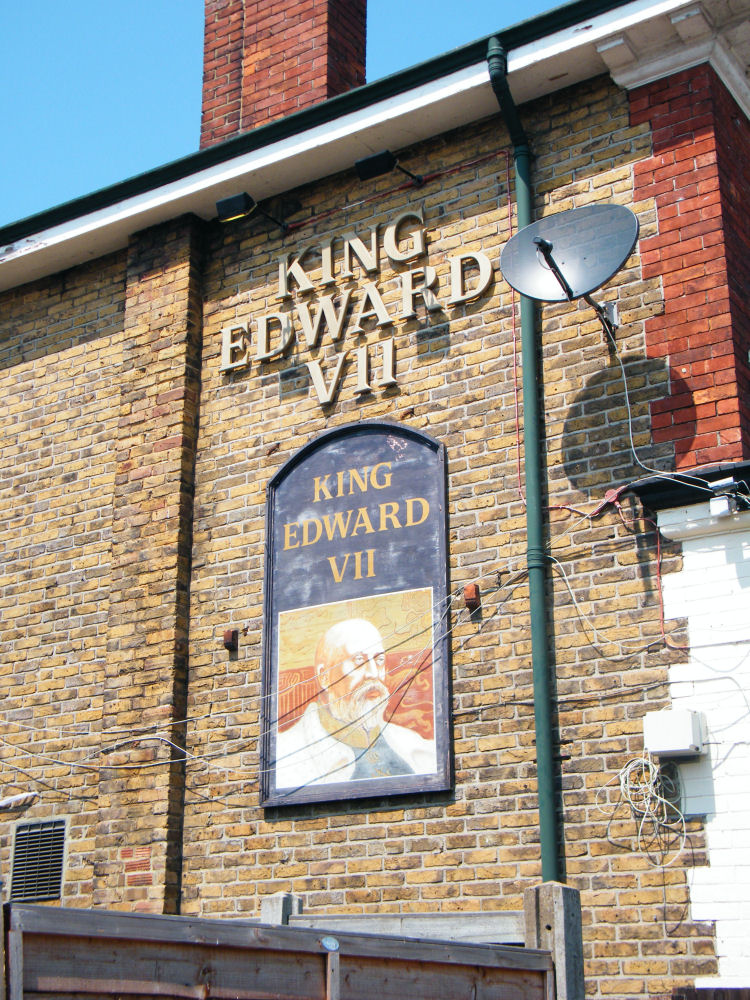
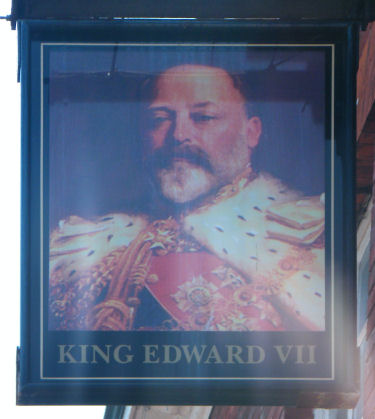
Above photos taken 4th June 2011 by Paul Skelton. The premises is now
operating as a Londis grocers, but still retains the pub signs and name
at present. |
LICENSEE LIST
 ROGERS William Henry
ROGERS William Henry
 1902-Jan/06 1902-Jan/06

HOLLINGHAM Frederick William Jan/1906-Jan/07 dec'd
 (Lately a
sergeant in the Army Service Corps. who had been invalided out of the Army.) (Lately a
sergeant in the Army Service Corps. who had been invalided out of the Army.)
HOLLINGHAM Mrs Daisy Augusta (widow) Jan/1907+

THACKARY Walter Simon 1907-Mar/09

 QUESTED Edward William Mar/1909-Aug/11 (age 46 in 1911
QUESTED Edward William Mar/1909-Aug/11 (age 46 in 1911 ) )

CASPARD Frederick Aug/1911-Oct/14

 PRYER Mr W T Oct/1914-16 end
PRYER Mr W T Oct/1914-16 end
PRYER Mrs 1916
CAIRNS James Robinson 1919-June/24

  
 KENTON Ernest Richard June/1924-32+
KENTON Ernest Richard June/1924-32+
  
PUGH John 1933-Oct/34

 SHIRLEY Capt. James Oct/1934-39
SHIRLEY Capt. James Oct/1934-39
  
KINGSNORTH Herbert senior 1939-47 end
KINGSNORTH Herbert Charles Wilson 1947-70 dec'd
   
 FLOYDD John W 1970
FLOYDD John W 1970
SEWELL William C 1972-78 end
 Whitbread Fremlins
Whitbread Fremlins
GRAY Edwin Paul 1978
ORD John 1987
TOWNSEND John & Mikey  Sept-Dec/2009
Sept-Dec/2009
TOWNSEND Barry 2010+
The Dover Express recorded that Mr. W. T Pryer was late of the
Inniskilling Fusiliers and recently manager of the "Friend
in Need."
 From the Post Office Directory 1922 From the Post Office Directory 1922
 From Pikes Dover Blue Book 1924 From Pikes Dover Blue Book 1924
 From the Post Office Directory 1930 From the Post Office Directory 1930
 From Pikes Dover Blue Book 1932-33 From Pikes Dover Blue Book 1932-33
 From the Post Office Directory 1938 From the Post Office Directory 1938
 From Pikes Dover Blue Book 1938-39 From Pikes Dover Blue Book 1938-39
 From Pikes Dover Blue Book 1948-49 From Pikes Dover Blue Book 1948-49
 From the Kelly's Directory 1950 From the Kelly's Directory 1950
 From the Kelly's Directory 1953 From the Kelly's Directory 1953
 From the Kelly's Directory 1956 From the Kelly's Directory 1956
 Library archives 1974 Library archives 1974
 From the Dover Express From the Dover Express
|
















